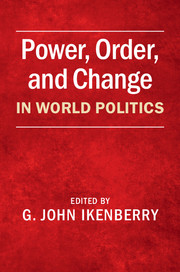Book contents
- Frontmatter
- Table of contents
- Contributors
- Acknowledgments
- Introduction: power, order, and change in world politics
- Part I Varieties of international order and strategies of rule
- Part II Power transition and the rise and decline of international order
- Part III Systems change and global order
- 7 Hegemony, nuclear weapons, and liberal hegemony
- 8 Brilliant but now wrong: a sociological and historical sociological assessment of Gilpin’s War and Change in World Politics
- 9 Nations, states, and empires
- Index
- References
9 - Nations, states, and empires
Published online by Cambridge University Press: 05 September 2014
- Frontmatter
- Table of contents
- Contributors
- Acknowledgments
- Introduction: power, order, and change in world politics
- Part I Varieties of international order and strategies of rule
- Part II Power transition and the rise and decline of international order
- Part III Systems change and global order
- 7 Hegemony, nuclear weapons, and liberal hegemony
- 8 Brilliant but now wrong: a sociological and historical sociological assessment of Gilpin’s War and Change in World Politics
- 9 Nations, states, and empires
- Index
- References
Summary
Introduction
Realism in all its forms suggests that war is always possible given the absence of any supreme Leviathan. The search for security can of course take many forms. One route is to seek total power, a search likely to be defeated and so ultimately against the logic of realism. Another route is to seek the protection of the strong, and a further one to seek alliances, often bearing in mind the classic maxim that “the enemy of my enemy is my friend.” For an outsider, this interrelated theoretical ensemble is a thing of beauty, on a par with classical economics, offering an elegant and parsimonious explanation of the ways in which states interact. But what is not offered by this approach is a theory of international relations. At least that is the claim of a new school of thought in the social sciences. A new data set created by Wimmer codes all wars between 1816 and 2001, and finds a strong correlation between the incidence of war and change in the institutional form of polity. Of course, the general point, and the means of establishing it, is not entirely new. Holsti’s Peace and War (1981) also counted the causes of war, over a longer time period although only in the core of world politics, and found that nationalism was ever more responsible for causing war in the late nineteenth and early twentieth centuries. The general analytic point is clear, and it deserves emphasis: wars are seen as resulting from social change rather than from the anarchic character of a multipolar world.
This dispute brings us immediately to the core of Gilpin’s brilliant work. We can see why by considering the key example he gives of system change, from empire and/or city-states to a world in which nation-states compete. The analytic matrix is clear. The power of a state rests on intensity married to appropriate size. Differently put, empires were too large to be socially intensive, whilst city-states lacked the size to make the intensity of their patriotic feelings matter in power politics. Gilpin further excoriates another pre-industrial form, that of feudalism, held to be decentralized and chaotic, an obstacle to the fiscal extraction on which the sinews of states depend.
- Type
- Chapter
- Information
- Power, Order, and Change in World Politics , pp. 263 - 285Publisher: Cambridge University PressPrint publication year: 2014
References
- 1
- Cited by



